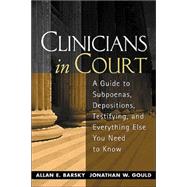Mental health professionals are often called on to give evidence or expert testimony in a range of circumstances, including family law and child welfare trials, mental health hearings, malpractice lawsuits, criminal trials, government hearings, and private arbitration.This volume provides practical information and proven guidelines to help clinicians from any background understand their role in legal proceedings--and participate effectively, ethically, and with minimal stress. Including case examples that illustrate each stage of the legal process, the book describes how to respond to subpoenas or contacts from lawyers; what to do to prepare for particular court actions or adjudicative proceedings; and how to ensure that all documentation is complete and legally admissible and confidentiality requirements are met. Also presented is valuable advice on avoiding legal pitfalls and coping with challenging situations on and off the witness stand. Special features include helpful checklists; samples of affidavits, retainer agreements, and other materials that can be adapted for use in the reader's own practice; and a glossary of relevant legal terms.








